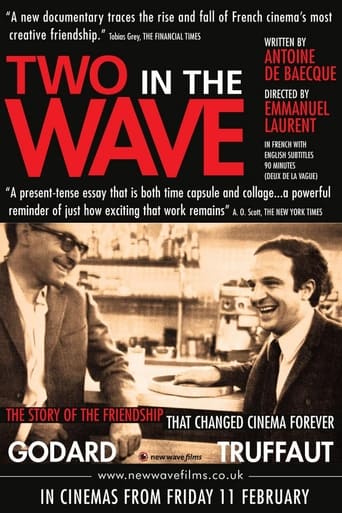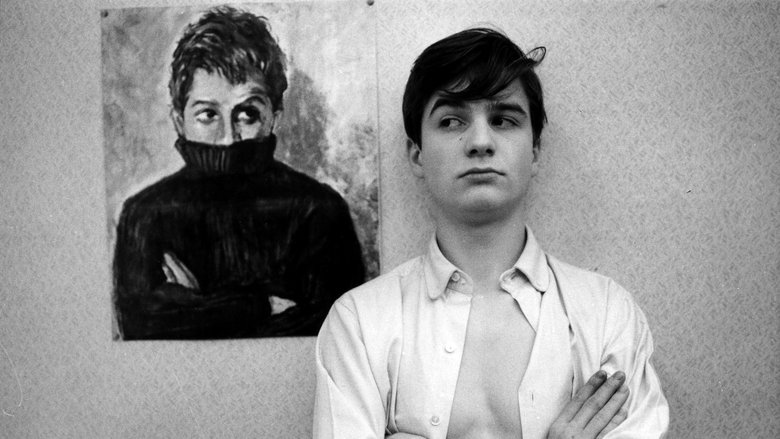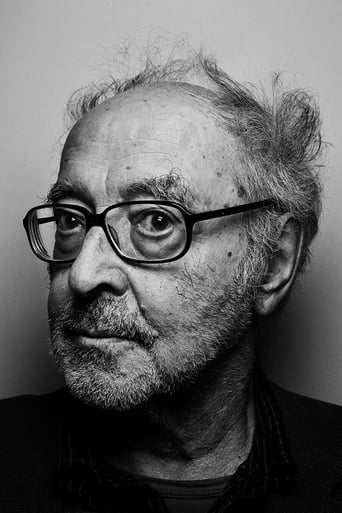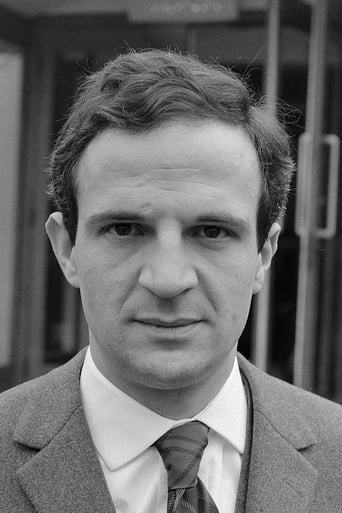
An in-depth analysis of the relationship between New Wave pioneers François Truffaut and Jean-Luc Godard, as seen through rare archival footage, interviews, and film excerpts — written and narrated by former Cahiers du Cinéma editor Antoine de Baecque.
Reviews
I love this movie so much
At first rather annoying in its heavy emphasis on reenactments, this movie ultimately proves fascinating, simply because the complicated, highly dramatic tale it tells still almost defies belief.
The film may be flawed, but its message is not.
Like the great film, it's made with a great deal of visible affection both in front of and behind the camera.
A 6 out of 10 is generous. The salvation of this documentary depends on what type of viewer you are. If you are a young high school kid and you want to get to know a little about Godard and Truffaut, then good. If you are a cinephile then you just love having a documentary about Godard and Truffaut to consume. But the film picks and chooses certain details of particular stories which is annoying to say the least. Probably the most infuriating part of the documentary is the refusal of the documentarian (or anybody) to have a hard-line opinion on anything, either man: their work, their beliefs, their opinions pertaining to the art form and in life, or the way they acted in certain situations, except some easy, sweeping generalities that are anything but revealing. Worth the watch, certainly, but in the end Two in the Wave is a lot of surface and not very much depth for two men and one behemoth of a movement that was as deep as anybody may ever know.
Francois Truffaut and Jean Luc Godard are the two most prominent film makers from the era of New Wave (Nouvelle Vague)a movement that not only revolutionized French film but world cinema. It was more than a wave, it was a Tsunami. In England the Kitchen Sink movement copied it's style. In NYC, Indy filmmakers took to the lower Manhattan streets like Godard did along the Champs Ellyses. In Hollywood it revolutionized the industry and the art form that would lead to its final golden era of the century. Their shadow indeed looms large over the history of cinema.More gossipy than analytical (and that's just fine given the mountains of material that already exists on Wave theory) Two in the Wave fleshes out through interviews the personalities, the friendship and the discord that ended their collaboration. Ironically, it was Truffaut banned by the establishment from attending Cannes for his incendiary attack as a critic on the French Film Industry only to triumphantly return a year later as a film maker with a winning entry ( The 400 Blows) who incurred the wrath of Godard for going establishment as his star rose.Before this though we have the two friends sharing an unquenchable passion for film making the groundbreaking Breathless together followed up by a series of highly original and fresh works on their own such as Jules and Jim, Les Carabaniers, Weekend and the Doinel series. There are interviews with key players involved in the movement including actor Jean Pierre Leaud who had roles in many of their films and counted both as friends.As mentioned earlier Truffaut drifted back into the mainstream with some medium cool efforts before his early demise (54) while Godard continued to remain off beat resulting in both commercial and critical oblivion over the next thirty years. All rather anti-climactic for a pair of intellectual rebels who stood the world of cinema on its ear over half a century earlier. Two for the Wave is worth a look if just to get a feel for a major milestone in the art of film and the two men who were its superstars.
My summary is not meant as harsh criticism--it's just a fact that this film has limited appeal to the average viewer. The average person out there simply doesn't care about terms like 'New Wave' or artistic differences between directors--they just want to be entertained. So, if you just want to be entertained, you'll find this tough going and if you are a cinephile, you'll probably get more out of this.The film is about the French New Wave movement--and in particular, François Truffaut and Jean-Luc Godard. While there were certainly other New Wave directors (such as Resnais, Rohmer and Chabrol), the film focuses in on these two for several reasons. First, they were among the most vocal and important New Wave directors--sort of like the prophets for the New Wave god. Second, their relationship, over time, changed--going from close friends and guys who respected each other's work to arch-rivals.The documentary is filled with TONS of clips of New Wave films--not just of the two subjects but most of the New Wave directors (I say 'most' because some, such as Melville, are omitted). For fans of the style, it's a great chance to relive memories of great films. What the film lacks, however, are interviews. While Truffaut died long ago, there certainly are many others who I would like to have heard from but the film instead is just film clips and narration. Because of this, it's all a bit frustrating. It's also a bit frustrating because the break between the two directors seemed a bit vague--as if a bit rushed and not explained adequately. I understood this section a bit better than most (having seen and reviewed a gazillion films), but just thought it could have and should have been more clear. Overall, interesting for some but also a bit short and perhaps lacking depth.
'Two in the Wave'/'Deux de la vague' is a gossipy French documentary about Jean Luc Godard and Françcois Truffaut with lots of period footage, "making of" clips and interviews especially. The Wave of course is La Nouvelle Vague, the movie revolution of the Fifties and Sixties those two directors are famously associated with. No sweeping analysis of the movement or its varied contributors, this is more a quick overview of the New Wave's early days with a focus on the style and contributions of those two key figures and the rise and fall of their friendship. It declined after the upheavals of 1968 and ended sharply in 1973 when Godard dismissed Truffaut after a visit to the set of 'Day for Night' as too unpolitical and Truffaut wrote Godard a letter calling him a "sh-t director." The title's a bit of a misnomer, though. "Three in the Wave" would have been as good, since toward the end Jean-Pierre Léaud, Truffaut's alter ego as "Antoine Doinel" from his seminal 400 Blows on, becomes an almost equally important, if mysterious, figure. The documentary, seemingly out of material about Truffaut (dead since 1984) and Godard (whose films are little noticed since the Sixties -- despite his having one in the current Cannes Festival) shifts to Léaud and describes how his work for both directors kept him from losing himself too much in "Antoine Doinel." De Gaulle Culture Minister André Malraux also is featured -- both as a godfather -- he gave his blessing to The 400 Blows' winning at Cannes, the New Wave's seminal moment, its first big success, and thus "representing France"-- and as a repressive force, when he tried to oust the French Cinématèque director Henri Langlois.The film chronicles how filmmakers, actors, and students demonstrated to save Langlois' position in February 1968, anticipating the revolutionary moment of Paris 1968 by three months. This action is a focus of Bertolucci's The Dreamers.A number of clips of Truffaut and Léaud show their close relationship, and there are more shots of Léaud at various stages of life than of any other person. The film ends with his screen test at 14, an image ab ovo, as it were, symbolizing the movement's eternal youth, as do a number of bright new-looking clips of Jean Seberg and Jean-Paul Belmondo in 'Breathless.' Nothing earthshaking here, no new discoveries, but a good introduction, the sort of thing a teacher could use in a film survey to introduce the class to French mid-century cinema. Particularly relevant to such an audience would be the way this film outlines the New Wave/Cahier du Cinéma crowd's debt to older directors like Nick Ray, Howard Hawks, Hitchcock (whom Truffaut did a book of interviews on), Fritz Lang (interviewed b Godard here), and so on. But deep research and searching analysis of stylistic and intellectual differences that may have existed from the start are lacking in this film.Plenty of archival material goes into Two in the Wave -- so much that to take account of and justify its presence shots of Isild Le Besco reading old magazines are interspersed throughout, though oddly, her voice is only used once or twice, and her presence is so unnecessary you wonder if she's somebody's girlfriend. There is also footage of Cannes 1959, when Les quatre cents coups won. Godard's first film, 'Breathless',' was also popular and there is footage of Paris movei-goers delivering a range of quick opinions outside the theater when the film was first shown. A restored print of 'Breathless' is to begin a commercial release in New York (May 28, 2010) for its 50th anniversary. After 'The 400 Blows' and 'Breathless' several of the directors' films bombed; the ascendancy of the La Nouvelle Vague seemed brief; it went on, of course.There are lots of quick clips of films by both directors to review their careers during the New Wave's heyday -- too many and too quick to make real sense of. For a while bits of interviews make this seem like a debate between Truffaut and Godard, but it comes to seem that Godard is going to get the last word. Except that the older Godard is little covered, and as mentioned, it's really the young Jean-Pierre Léaud who gets to speak in the very last frames. On Allociné Antoine de Baecque is listed as co-director of this film. De Baecque is a prolific writer on film, including the Nouvelle Vague, and biographer of Truffaut and more recently Godard, who wrote and narrated most of the film.Released May 19, 2010 at Film Forum in New York; not yet released in France. The cleaned up 'Breathless' also debuts here. NY Times film critic A.O. Scott has written a piece called "A Fresh Look Back at Right Now" (May 21, 2010) about the continuing relevance of Godard's first feature, right up to Tarantino and beyond. Too bad this film doesn't go further in that direction.
Top Streaming Movies
















